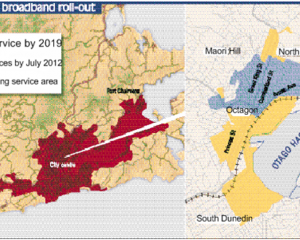A joint proposal by Telecom and Vodafone is one of three shortlisted by the Government for its rural broadband initiative (RBI).
The other two short-listed proposals, out of five received, were from FX Networks/OpenGate and from Torotoro Waea, Communications and Information Technology Minister Steven Joyce said today.
A proposal from the New Zealand Regional Fibre Group (NZRFG) of lines and local fibre companies was unsuccessful.
Shortly after the shortlist was announced, the NZRFG said it was questioning why the Ministry of Economic Development was persevering with contracting a single service provider for the RBI.
NZRFG chief executive Vaughan Baker said the ministry should have required the separation of the services from the underlying utility fibre infrastructure.
"It is disappointing that our wholesale only, service provider agnostic approach has not been allowed to make the shortlist," Mr Baker said.
It was ironic that members of the NZRFG had been the preferred choices to build urban fibre networks, but may have no direct part to play in building a rural fibre network.
Yesterday, Northpower and WEL Networks-owned Ultra Fast Fibre were contracted to begin building the first parts of the Government's ultra-fast broadband (UFB) network in some centres in Northland and the middle of the North Island.
Every other member of the NZRFG group was short-listed for negotiations with Crown Fibre Holdings to build UFB networks in the remaining 25 urban centres the Government had deemed priority areas to receive world-class broadband, Mr Baker said.
"...so we obviously have a recipe that is of appeal".
In the Government's announcement today, Mr Joyce said the proposals short-listed for the RBI had merited further evaluation based on their plans to deliver the RBI objectives and provide open access to government-subsidised infrastructure.
Innovative approaches were helping to lower deployment costs, extend fixed and wireless coverage, and get the fibre backbone further into rural New Zealand.
"I expect to see this collaboration strengthening as the process moves forward into the negotiation stage later this month," Mr Joyce said.
The goal of the initiative is to see 80 percent of rural households getting speeds of at least 5Mbps and the remainder receiving at least 1Mbps. In addition, the proposals offer to connect at least 93 percent of rural schools to fibre.
Binding contracts were expected be signed in early 2011, Mr Joyce said.
Last month Telecom and Vodafone said they were proposing to combine resources to build new, open access network infrastructure to provide broadband in rural areas using a range of technologies.
The proposed solution would extend Telecom's existing fibre infrastructure by 3000km taking it to key rural points, including schools and hospitals, while Vodafone would build 154 new mobile towers.
Both fibre and wireless components would be available on an equivalent basis to access seekers and wholesale customers, allowing any party to offer a retail service over the new infrastructure.




